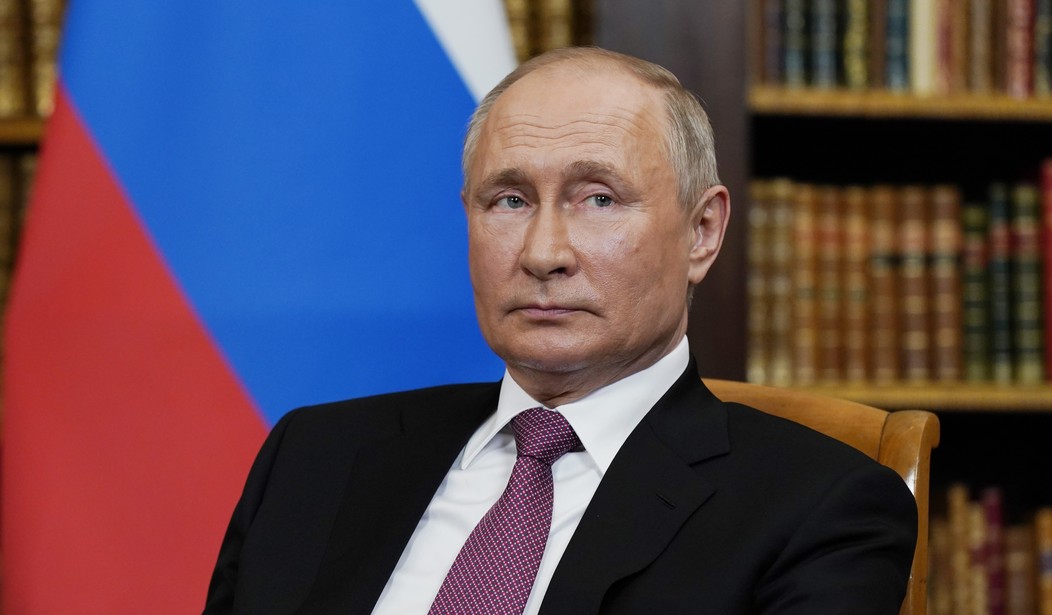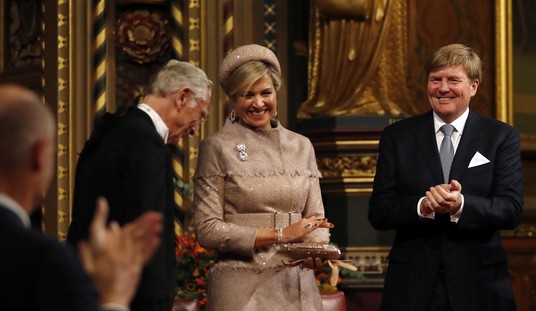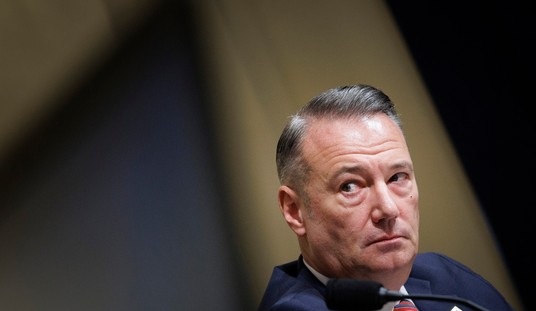Has Ukraine offered new concessions to end Russia’s war? Or is Vladimir Putin looking for an easy way out of a quagmire of his own making? Given the ridiculous nature of the exercise in Anatolia yesterday, Putin’s sudden bon mot about negotiations gives off a whiff of desperation:
President Vladimir V. Putin said there had been “certain positive shifts” in Russia’s talks with Ukraine. Speaking in the Kremlin at the beginning of a meeting with his Belarusian counterpart, Aleksandr G. Lukashenko, Putin said that Russian representatives had reported to him that there had been some progress in the negotiation process that continued “practically on a daily basis.”
What progress in negotiations? Putin sent Sergei Lavrov to Turkey yesterday to meet with his counterpart Dmytro Kuleba in what was initially hailed as the highest-level talks between the combatants. Not only did this produce nothing more than the ludicrous claim from Lavrov that Russia “didn’t invade Ukraine,” Putin made sure that it wouldn’t produce anything more. He didn’t give Lavrov authority to negotiate anything except a surrender, as Kuleba later lamented, and clearly didn’t have any interest in any “positive shifts” other than capitulation.
And Ukraine has made it abundantly clear that they’re not going to capitulate. So what “positive shifts” has Putin seen? Probably the negative results that his military have produced thus far, and the fact that the quagmire might get worse. CNN asked Gen. James “Spider” Marks to look at the latest satellite data on that 40-mile Russian convoy — actually a series of convoys that got jammed up together — and figure out what happened to it. Marks suggests that the recent data looks like “good news for the Ukrainians”:
"This is, frankly, good news for the Ukrainians"
Retired Maj. Gen. James "Spider" Marks analyzes new satellite images of the 40-mile Russian convoy and explains possible military strategies to @NewDay's @brikeilarcnn. Watch his full analysis here: https://t.co/dPMEhvsjXa pic.twitter.com/K03dNZdy45
— CNN (@CNN) March 11, 2022
Former CIA director and retired 4-star Gen. David Petraeus says that the Russians have finally adopted the correct tactics for a stalled convoy. Petraeus called Russian tactics “unconscionable” in terms of military competence, and the losses that result from them have been devastating:
Petraeus now thinks that the Russian army won’t even be able to encircle Kyiv, let alone sack and control it. They might be able to level it from a distance, but the lines of communication have broken down too much to effectively get around to the south of the city. That will allow the Ukrainians to keep reinforcing the defense of their capital — and of course, that will also allow Volodymyr Zelensky to continue his stirring and inspirational leadership.
One Estonian journalist hears from that country’s intel community that the situation may be getting even worse for the Russians. Russia has launched some opening attacks in western Ukraine, but they’re having trouble getting enough forces in place to move the lines substantially forward. In fact, the problem might be holding the lines where they stand at the moment:
Since last Sat it's been relatively stable on the fronts. There is an expectation of a reforming of RU units and a new line of attack, but so far little evidence of it. "If Russia doesn't achieve a remarkable advance by end of week, difficult to see how it should come at all."
— Holger Roonemaa (@holger_r) March 11, 2022
The question is if Moscow today forces Lukashenko to send in the troops from Belarus, but BY troops' motivation is even lower than that of RU. "The Western-Ukrainian national & anti-Russian environment would be extra hostile towards them."
— Holger Roonemaa (@holger_r) March 11, 2022
Ukraine's counter-offensive has so far been small-scale but when RU stalls, they have resources to start pressing. First aim would be to drive RU out of country in the North (Kyiv and Kharkiv).
— Holger Roonemaa (@holger_r) March 11, 2022
Some of this might be wishful thinking, but it’s a fact that Russia still hasn’t achieved any of its major objectives after two weeks of fighting. As Petraeus points out, the Russian military has exposed numerous weaknesses and incompetence that have surprised Western analysts, who expected a relatively quick military campaign followed by a years-long insurgency. Now it looks like Russian formations have stalled and will eventually get chewed to pieces without ever seizing these cities, or only doing so at great cost.
That’s why Putin is desperate to find reserves, and to find them anywhere except from Russia. Syrian mercenaries might provide enough fresh troops to break a logjam around one of the cities, but they will also be fighting in elements that are totally unfamiliar and likely with poor communication among Russian-speaking units around them. Putin wanted troops from Belarus to minimize those issues, but Belarus’ military appears to be in a soft revolt over the prospect of fighting for Putin in Ukraine. Counterpunch’s Zoltan Grossman thinks this might be weighing on Putin’s mind too:
One key to ending the war in Ukraine may be in an unexpected place: Belarus. On February 28, Ukrainian intelligence warned that Belarusian troops would join the Russian invasion, but the reports were refuted by U.S. intelligence, and those troops did not cross the border. Now we may know why: massive dissent within the Belarusian military.
First a little background. Massive pro-democracy protests rocked the regime of Alexander Lukashenko in 2020, after he stole an election from opposition leader Svetlana Tikhanovskaya. Lukashenko called on Putin to send Russian troops to crush the protests, and threats forced Tikhanovskaya to flee to Lithuania. Some military officials and draft-age youth also left at the time. Lukashenko’s hijacking of a civilian jetliner last year caused most countries to cancel all flights to the capital of Minsk. He most recently allowed Russia to use Belarus as a staging area for the Ukraine invasion.
One of Tikhanovskaya’s senior advisers, Franak Viacorka, confirms that Putin had planned for the Belarusian military to join his invasion (which Minsk denies). But the plan was foiled by a series of resignations by senior military officials, who fled the country and contacted the opposition-in-exile. Moreover, hundreds of young Belarusians of draft age have also fled across the closed borders, which is “dangerous and expensive.”
Viacorka commented, “We know there is a high degree of demoralization among officers in the military. In addition, there is a great deal of demoralization among conscripted soldiers, who are fleeing the country’s borders en masse to any destination possible, including Russia, Kazakhstan, and the Baltic states.”
Grossman wonders if the Ukrainians might back a renewed revolt against Aleksandr Lukashenko. They’ve got their hands full at the moment, but Lukashenko has to be worried about that potential as well as a hard revolt in the military over orders to attack Ukraine.
If that is indeed what is happening, those are truly “positive shifts.” Just not for Putin, who is realizing that Zelensky speaks his language better than Putin does.








Join the conversation as a VIP Member